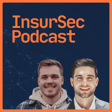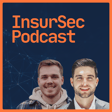
David Kruse - The Philosopher of Cyber Insurance
This week on the InsurSec Podcast, listeners are going on a philosophical exploration of cyber insurance, guided by the wisdom of David Kruse!
Drawing on the ideals of Socrates, David advocated for the virtue of self-knowledge, encouraging the insurance industry to examine itself deeply and bring in diverse perspectives. In the spirit of Aristotle, he shone the light of logical analysis on cyber insurance issues, while epitomizing the examined life.
Channeling Kant's duty-based ethics, David suggested moral imperatives around ransomware that supersede pure utilitarianism, which Mill might propose. Yet he also embodied the pragmatism of American philosophers like William James in his solutions.
As the Dude might abide, or Aristotle opine on virtue between extremes, David walked the middle path between profit and ethics. His unique background combines the care for humanity of Humanists like Erasmus with the logic of Aristotle and systems thinking of Comte.
In the tradition of questioning thinkers like Socrates or existentialist Kierkegaard, David forces us to re-examine assumptions about talent, technology and cybersecurity. Like Plato's Philosopher King, he integrates noble ideas and practical realities.
So join David on the examined cyber insurance life, connecting with him to further explore the conceptual foundations of our industry.

